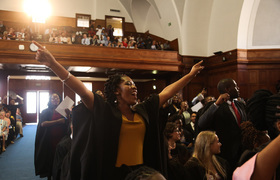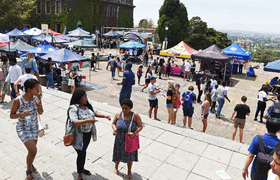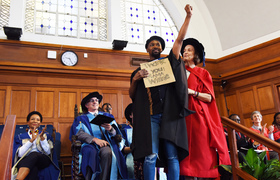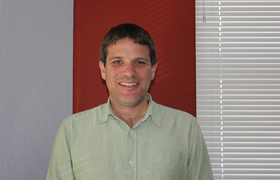Graduation speakers call for activism
06 April 2018 | Story Penny Haw. Photos Robyn Walker. Video Saadiq Behardien. Read time 7 min.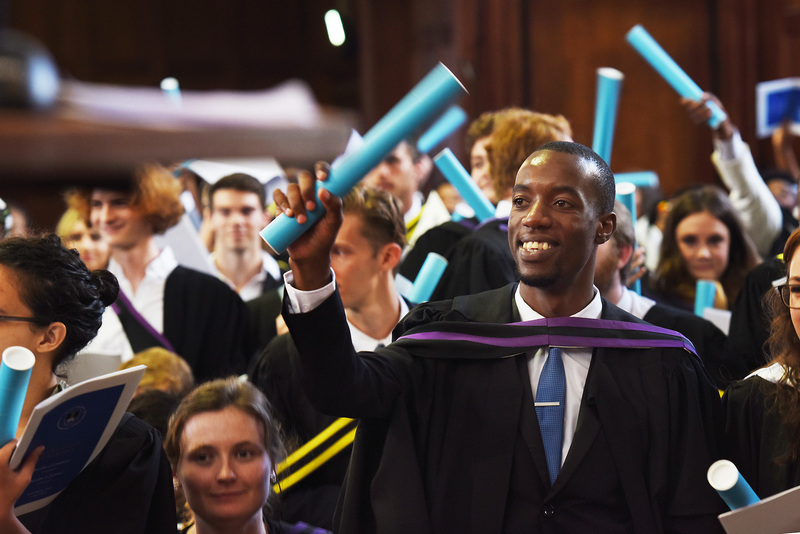
If there were a theme for day three of UCT’s seven-day graduation season, it would be the call for graduands to become active citizens and surpass the achievements of their parents.
During the morning ceremony, Professor Mark New, Pro Vice-Chancellor for Climate Change and director of the African Climate and Development Initiative, addressed 256 graduands from the faculties of Commerce and Science.
New acknowledged how difficult and complicated recent years have been for students and the university, but said that he believed everyone had changed for the better. He also set out the challenges that lie ahead for graduates in a country facing social, economic and political hurdles in a world where natural resources are under unprecedented stress.
Apologising to graduands for the “creaky system” they have inherited from his generation, New said he hoped that their studies would provide them with the knowledge, tools and critical capabilities to change the system, or parts of it, for a better and more sustainable future.
“I think, individually, it’s up to each of us to choose whether to be passive or active in society and to choose where and how we are active – at work, as leaders, as community workers, in small ways and large ways, in few ways and in many ways,” he said.
“But at the end, I think when we all look in the mirror of our lives, we want to not regret the things we didn’t do. We want to not regret the moments that we should have been active rather than passive.”
New concluded his speech by encouraging the graduands to “be the leader you’ve been waiting for”.
Significant contribution
The afternoon session, during which 182 Faculty of Health Sciences graduands received their degrees, included the conferring of the President of Convocation Medal to Dr Sophia Kisting-Cairncross. The medal is awarded to an alumnus who has made a significant contribution to the common good.
Kisting-Cairncross, who grew up in rural Namibia and enrolled for an MBChB at UCT in 1969 with the help of merit bursaries, is the executive director of the National Institute for Occupational Health of South Africa. Prior to that, she spent seven years with the United Nations at the International Labour Organization in Geneva.
Her pro-poor work with government departments, employers and workers is widely recognised and, in 2003, Kisting-Cairncross was named one of the world’s 10 most influential women in occupational health services.
In delivering her address, Kisting-Cairncross reflected on her time as a UCT student during apartheid. She acknowledged that while she benefited from the support and teaching of several exceptional people, it was often difficult and painful.
“In my fifth year as a medical student, myself and a colleague decided that we were fed up with doing medical examinations of patients only on the black side of Groote Schuur and decided, on a particular day, to go to the white side of the hospital,” she recalled.
“We were called out and told that we ran the risk of being expelled from UCT because we dared to come to a ward round on the white side. We were told that we were jeopardising the opportunity for other students of colour to attend the university.
“I’m telling you this not only to show how much has changed, but also to encourage you to talk about the problems that remain, however uncomfortable they might seem.
“We must not let discrimination (of the past and present) define us, but we must talk about problems – not because we want to apportion blame, but because they affect our futures and how we will raise our children.”
Focus on individual rights
Human rights have always been a key issue for Kisting-Cairncross, who says she learned the subject “at my mother’s knee” in Namibia. Her mother regularly paid the half crown it cost to send a telegram to the United Nations (UN) in New York to protest the apartheid regime during South Africa’s occupation of Namibia (then South West Africa).
“When I started working for the UN and ended up in at the headquarters in New York, I went to see where they kept those telegrams,” she said. “They have been archived and tell a story, which I hope one of the sons or daughters of southern Africa will one day take up.”
The lessons Kisting-Cairncross learned about human rights from her mother and subsequent teachers have played a central role in her life. She urged graduands to protect not only their own rights, but also the individual rights of everyone else.
“Often in the southern Africa context, we think that it is okay to look at collective human rights, but many of the problems we have are because we do not respect individual rights enough.”
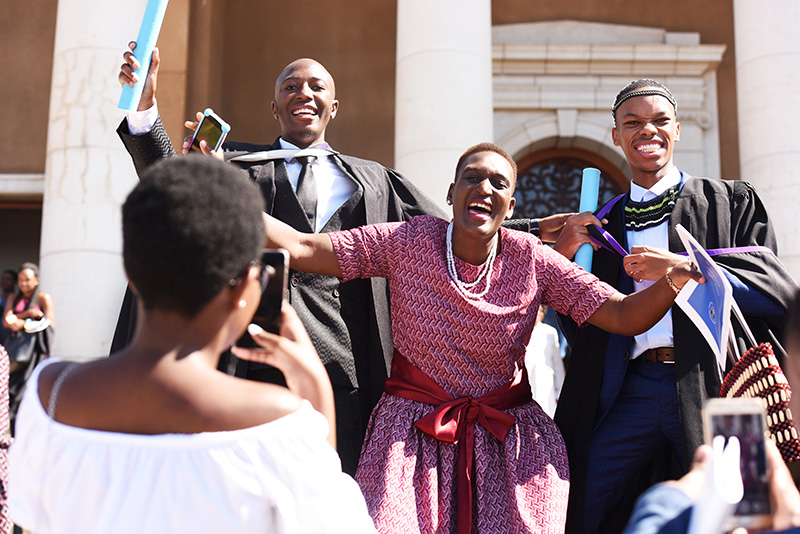
Fight inequality
One of the symptoms of not valuing individual rights, she said, is reflected in the recent World Bank report, which says that South Africa is the most unequal country in the world.
“How is it possible that this country, with all of us – wherever we come from, whatever background we have – having contributed so much, ends up 25 years into our democracy as the most unequal country as far as socio-economic outcomes are concerned?
“I cannot but step back and ask if my generation and those around us could not have done more to find a way to achieve greater equality and greater equity in our country.”
She urged graduands to take up the cudgels and find ways of ensuring that every decision they make helps reduce inequality.
“It is not going to come from governments; it has to come from us as the citizens of the country,” she insisted.
“Inequality is our Achilles heel. We, each and every one of us, have to find a way to address it because in our own little way, we can do a lot about it.”
 This work is licensed under a Creative Commons Attribution-NoDerivatives 4.0 International License.
This work is licensed under a Creative Commons Attribution-NoDerivatives 4.0 International License.
Please view the republishing articles page for more information.







